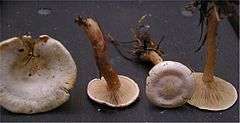Ripartites tricholoma
| Ripartites tricholoma | |
|---|---|
 | |
| Ripartites tricholoma | |
| Scientific classification | |
| Kingdom: | Fungi |
| Division: | Basidiomycota |
| Subdivision: | Agaricomycotina |
| Class: | Agaricomycetes |
| Order: | Agaricales |
| Family: | Tricholomataceae |
| Genus: | Ripartites |
| Species: | R. tricholoma |
| Binomial name | |
| Ripartites tricholoma (Alb. & Schwein.) P.Karst. | |
Ripartites tricholoma, commonly known as the bearded seamine, is a species of fungus in the Tricholomataceae family. It was first described scientifically as Agaricus tricholoma by Albertini and Lewis David von Schweinitz in 1805,[1] and later transferred into the genus Ripartites by Petter Karsten in 1879.[2] It is found in North America and Europe,[3] and has also been collected in Costa Rica.[4]
Description

This fungus is reminiscent of a Clitocybe, but the spore powder is light brown instead of white, and when young the cap rim is surrounded by spine-like hairs, which quickly disappear. The cap is convex and whitish with a diameter ranging up to 7 cm (the sources differ on the range of dimensions). The gills are off-white and they are somewhat decurrent down the brownish stem, which has a white frosting ("pruina") when fresh. The flesh has a mild taste and the smell is not distinctive. The roughly spherical spores are warty and about 5 um x 4 um in size.[5][6][7]
References
- ↑ Albertini JB, Schweinitz LD von. (1805). Conspectus Fungorum in Lusatiae superioris (in Latin). p. 188.
- ↑ "Rysslands, Finlands och den Skandinaviska halföns Hattsvampar. Förra Delen: Skifsvampar". Bidrag till Kännedom of Finlands Natur Folk. 32: 477. 1879.
- ↑ Phillips R. "Ripartites tricholoma". Rogers Mushrooms. Retrieved 2010-12-08.
- ↑ Halling RE, Mueller GM. "Ripartites tricholoma (Alb. & Schw.:Fr.) P. Karst.". Macrofungi of Costa Rica. Retrieved 2010-12-08.
- ↑ Bon M. (1987). The Mushrooms and Toadstools of Britain and North-western Europe. 7 Bond Street, St. Helier, Jersey: Domino Books Ltd. p. 146. ISBN 0-340-39935-X.
- ↑ Eyssartier G. & Roux P. (2013). Le Guide des Champignons France et Europe (in French). 8, rue Férou, 75278 Paris: Editions Belin. p. 938. ISBN 978-2-7011-8289-6.
- ↑ Knudsen, Henning; Jan Vesterhout (2008). Funga Nordica. Copenhagen: Nordsvamp. p. 412.